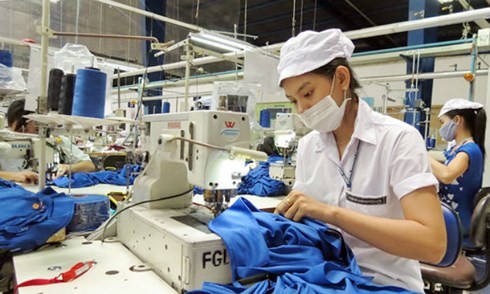(VOVWORLD) -Trade unions at all levels have worked to protect the legitimate rights and interests of workers. Vietnam’s greater integration into the global economy requires that unions reform their operations.
 The first priority of the grassroots trade unions is to deal with industrial relations and take care of workers. The first priority of the grassroots trade unions is to deal with industrial relations and take care of workers. |
Vietnam has signed, implemented, and negotiated a total 16 Free Trade Agreements, which is seen as a good opportunity for Vietnamese trade unions to modernize.
Challenges facing trade unions
The FTAs which Vietnam has joined or will join emphasize labor rights and environmental protection to ensure that trade contributes to sustainable development and helps employees and employers share economic benefits.
On March 8, 2018, Vietnam and 10 other economies signed the Comprehensive Progressive Agreement for Transpacific Partnership (CPTPP). Ngo Duy Hieu, Head of the Labor Relations Department of the Vietnam General Confederation of Labor, outlined the challenges posed by the Agreement: “The CPTPP is a high-standard agreement, which allows the establishment of other organizations representing workers, in addition to the Vietnam Trade Union as well as their right to connectivity for a certain period of time, specifically from 5 to 7 years after the CPTPP takes effect. So the Vietnam General Confederation of Labor will no longer be the only organization representing workers. Competition and attraction of new trade union members will be inevitable. Membership growth and grassroots trade unions will face obstacles. Resources, particularly financing for trade union activities, will be shared and reduced. The trade unions’ working environment will change dramatically due to more complex industrial relations.”
Vietnam General Confederation of Labor’s reform
The first priority of the grassroots trade unions is to deal with industrial relations and take care of workers. Grassroots trade unions must listen to their members and work with employers to resolve disputes. Prof. Dr. Phung Huu Phu, Vice President of the Party Central Committee’s Theoretical Council, said: “Trade union activities will face fierce competition. Trade unions should reform itself to prove to be the most fundamental and largest organization, capable of protecting the rights of the working class and promoting self-determination and creativity. Trade unions should stand side by side with the workers and work for them.”
The Vietnam General Confederation of Labor, a member of the National Wage Council, is urged to play a greater role in adjusting base salaries. Hoang Thi Thanh, Head of the Foreign Relations Department of the Vietnam General Confederation of Labor, suggests that Vietnamese union organizations continue to advise the National Assembly and government in revising the Labor Code and the Law on Trade Unions, while strengthening grassroots operations. She said: "Reform should encourage members to set up grassroots trade unions and elect executive boards. The operations of trade unions should be made more effective by increasing the number of full-time trade unionists at a higher level. At the grassroots level, a company which employs more than 1,000 people should have full time unionists.”
The Vietnam General Confederation of Labor is drafting a project to reform Vietnam’s trade unions, which will be summated to the 12th National Trade Union Congress for approval later this year.